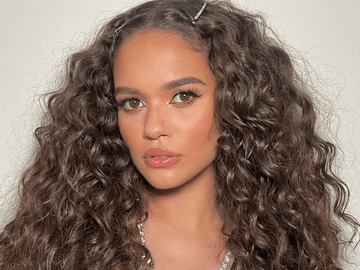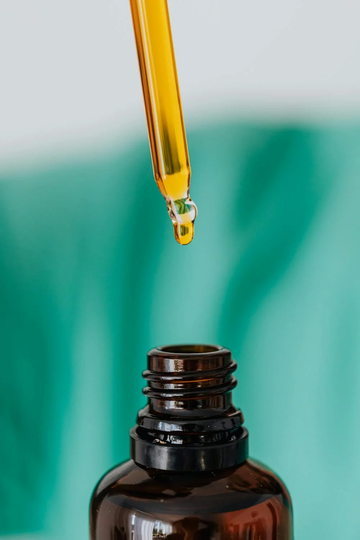Unlock the Secret to Luxurious Locks: Which Oil is Best for Hair Growth and Thickness?
Are you tired of lackluster locks and dreaming of hair that's thick, strong, and luscious? It's not just you; many of us crave the confidence that comes with a fabulous mane. But with so many hair products flooding the market, it's hard to know which ones really deliver results.
Fortunately, today we're going deep into the world of hair oils and identifying the best one for boosting growth and thickness— and we’ll even reveal the secrets to achieving the hair of your dreams. From understanding the science behind hair growth to discovering the best oils recommended by experts, consider this your ultimate resource for unlocking the secret to luxurious locks.
The science behind hair growth
{Alt text: A woman with an off-the-shoulder black short touching her short hair. Source: pexels}
Understanding the intricate process of hair growth begins with grasping the hair growth cycle. Hair follicles undergo three main stages: anagen, catagen, and telogen.
Anagen Phase
This is the active phase of hair growth, where hair cells divide rapidly, leading to the production of new hair strands. The duration of this phase varies depending on genetics and other factors but typically lasts anywhere from two to seven years.
Catagen Phase
Following the anagen phase, hair follicles enter a transitional stage known as catagen. During this phase, hair growth slows down, and the hair follicle detaches from the blood supply, leading to the cessation of hair growth. This phase lasts for about two to three weeks.
Telogen Phase
The final stage of the hair growth cycle is telogen, also known as the resting phase. During this period, the hair follicle remains inactive, and the hair shaft eventually sheds, making way for new hair growth. Telogen typically lasts for around three to four months before the cycle repeats.
Various factors can influence the duration and quality of each phase, including genetics, hormonal fluctuations, diet, and stress levels. Hair oils play a crucial role in supporting healthy hair growth by nourishing the scalp, improving blood circulation, and providing essential nutrients to the hair follicles. By understanding the science behind hair growth, we can better appreciate the role that hair oils play in maintaining strong, vibrant hair.
Best Oils for Hair Growth and Thickness
When it comes to choosing the best oils for promoting hair growth and thickness, there are several standout options recommended by experts in the field of hair care. These oils are renowned for their ability to nourish the scalp, strengthen the hair shaft, and stimulate follicles for improved growth. Let's explore some of the most effective oils for achieving the hair of your dreams:
Coconut oil
Coconut oil is a versatile and widely celebrated oil in the realm of hair care, renowned for its deep moisturizing properties and ability to nourish hair from root to tip. Here’s what makes it stand out:
– Deep Moisturization: Coconut oil is rich in fatty acids that penetrate the hair shaft, providing deep hydration and helping to prevent breakage and split ends.
– Strengthens Hair: By reducing protein loss, it can strengthen the hair shaft and improve hair elasticity.
– Natural Shine: Regular use of coconut oil can impart a healthy shine to dull and dry hair, leaving it looking glossy and vibrant.
– Antimicrobial Properties: Coconut oil contains lauric acid, which has antimicrobial properties that can help prevent scalp infections and promote a healthy scalp environment.
– Versatility: Coconut oil can be used in various hair care routines, including as a pre-shampoo treatment, leave-in conditioner, or styling aid.
Coconut oil's ability to deeply moisturize and nourish the hair makes it a popular choice for promoting hair growth and thickness. Its lightweight texture and pleasant scent make it suitable for all hair types, from fine and straight to thick and curly.
Dermatologist Recommendations
While many swear by the benefits of coconut oil for hair, dermatologists have varying opinions on its use. Some argue that coconut oil may be too heavy for certain hair types, especially those prone to greasiness or buildup. Additionally, individuals with coconut allergies should avoid using coconut oil to prevent adverse reactions. However, for most people, coconut oil is considered safe and effective when used in moderation as part of a balanced hair care routine.
In summary, coconut oil is a powerhouse ingredient for promoting hair growth and thickness, thanks to its moisturizing properties and ability to strengthen the hair shaft. While it may not be suitable for everyone, it remains a popular choice among those seeking natural solutions for healthier, more vibrant hair.
Argan oil
Derived from the kernels of the argan tree native to Morocco, argan oil has gained widespread popularity in the beauty industry for its numerous benefits for hair and skin. Let's explore why argan oil is a top contender for promoting hair growth and thickness:
– Rich in Antioxidants: Argan oil is packed with antioxidants, including vitamin E, which help to protect the hair from damage caused by free radicals and environmental stressors.
– Deep Conditioning: The fatty acids present in argan oil penetrate the hair shaft, providing deep conditioning and moisture to dry and damaged hair.
– Frizz Control: Argan oil helps to smooth the hair cuticle, reducing frizz and flyaways and leaving the hair looking sleek and polished.
– Heat Protection: When applied to damp hair before heat styling, argan oil acts as a barrier, protecting the hair from heat damage and minimizing breakage.
– Lightweight Texture: Despite its nourishing properties, argan oil has a lightweight texture that won't weigh down the hair or leave it feeling greasy.
Argan oil is extracted from the kernels of the argan tree, which is native to Morocco. This luxurious oil has a golden hue and a subtle nutty aroma, making it a delight to use in hair care routines. Its lightweight texture absorbs quickly into the hair without leaving any residue, leaving hair feeling soft, smooth, and incredibly nourished.
Dermatologist Recommendations
Dermatologists often recommend argan oil for its ability to hydrate and nourish the hair without causing buildup or irritation. Its non-comedogenic properties make it suitable for all hair types, including those with sensitive scalps or oily hair. However, individuals with nut allergies should exercise caution when using argan oil and perform a patch test before applying it to their hair.
In summary, argan oil is a versatile and effective oil for promoting hair growth and thickness. Its rich antioxidant content, deep conditioning properties, and lightweight texture make it a favorite among hair enthusiasts looking to achieve healthy, vibrant locks.
Jojoba Oil
Derived from the seeds of the jojoba plant, native to the southwestern United States and northern Mexico, jojoba oil is renowned for its unique composition and multitude of benefits for hair and skin. Let's delve into why jojoba oil is a top choice for promoting hair growth and thickness:
– Balances Oil Production: Jojoba oil closely resembles the natural oils produced by the scalp, making it an excellent choice for balancing oil production. It hydrates dry scalp and hair while regulating sebum production in oily scalp conditions.
– Moisturizing: The lightweight texture of jojoba oil allows it to penetrate the hair shaft easily, providing deep hydration and moisture to dry, brittle hair.
– Strengthens Hair: Jojoba oil contains vitamins and minerals that nourish the hair follicles, promoting stronger, healthier hair growth and reducing the risk of breakage.
– Soothing: Jojoba oil has anti-inflammatory properties that can help to soothe irritated scalp conditions, such as dandruff or psoriasis, and promote a healthy scalp environment.
– Non-comedogenic: Jojoba oil is non-comedogenic, meaning it won't clog pores or cause buildup on the scalp, making it suitable for all hair types, including sensitive scalps.
Jojoba oil is a golden-yellow liquid with a mild nutty aroma. Its texture is similar to that of natural sebum, making it easily absorbed by the skin and hair without leaving a greasy residue. Jojoba oil is prized for its versatility and can be used on its own as a hair treatment or mixed with other oils and ingredients to create customized hair care products.
Dermatologist Recommendations
Dermatologists often recommend jojoba oil for its gentle yet effective moisturizing properties. Its similarity to the skin's natural oils makes it suitable for individuals with sensitive skin or scalp conditions. Jojoba oil can be used regularly as part of a hair care routine to promote hair growth, improve hair texture, and maintain a healthy scalp.
In summary, jojoba oil is a versatile and effective oil for promoting hair growth and thickness. Its ability to balance oil production, moisturize the hair and scalp, and soothe irritation makes it a valuable addition to any hair care routine.
Rosemary Oil
Rosemary oil has been used for centuries for its aromatic scent and medicinal properties, including its ability to promote hair growth and thickness. Let's explore why rosemary oil is a favorite among hair enthusiasts and how it can benefit your hair:
– Stimulates Circulation: Rosemary oil is known for its ability to increase blood circulation to the scalp, which in turn promotes hair growth by delivering essential nutrients to the hair follicles.
– Antioxidant-Rich: Packed with antioxidants, rosemary oil helps to neutralize free radicals that can damage hair follicles and inhibit hair growth.
– DHT Blocker: Rosemary oil contains ursolic acid, which has been shown to inhibit the production of dihydrotestosterone (DHT), a hormone linked to hair loss and thinning.
– Antimicrobial: Rosemary oil has antimicrobial properties that can help prevent scalp infections and promote a healthy scalp environment, reducing the risk of hair loss.
– Balances Oil Production: Rosemary oil helps to balance oil production on the scalp, making it suitable for all hair types, including oily and dry scalp conditions.
Rosemary oil is derived from the leaves of the rosemary plant through steam distillation. It has a refreshing herbal aroma with hints of pine and citrus, making it a popular choice for aromatherapy and hair care. The oil is clear and has a thin consistency, allowing it to be easily absorbed by the scalp and hair follicles.
Dermatologist Recommendations
Dermatologists often recommend rosemary oil for its proven benefits in promoting hair growth and thickness. Its ability to stimulate circulation, block DHT, and maintain a healthy scalp environment makes it an effective natural remedy for hair loss and thinning. However, individuals with sensitive skin or scalp conditions should perform a patch test before using rosemary oil to ensure compatibility.
What do we think? Rosemary oil could be a powerful ally in the quest for thicker, healthier hair. Its stimulating properties, antioxidant content, and scalp-balancing effects make it a valuable addition to any hair care routine.
Castor Oil
Castor oil is a thick, viscous oil derived from the seeds of the castor bean plant, known scientifically as Ricinus communis. Despite its thick consistency, castor oil is celebrated for its numerous benefits for hair and scalp health. Let's explore why castor oil is a popular choice for promoting hair growth and thickness:
– Ricinoleic Acid: Castor oil is rich in ricinoleic acid, a monounsaturated fatty acid that has been shown to stimulate hair follicles, promoting hair growth and thickness.
– Antimicrobial: Castor oil has antimicrobial properties that can help to prevent scalp infections and promote a healthy scalp environment, reducing the risk of hair loss.
– Deep Conditioning: Despite its thick texture, castor oil penetrates deep into the hair shaft, providing intense hydration and nourishment to dry, brittle hair.
– Reduces Hair Breakage: By moisturizing and strengthening the hair shaft, castor oil helps to reduce the risk of hair breakage and split ends, resulting in longer, healthier hair over time.
– Natural Lubricant: Castor oil acts as a natural lubricant, helping to detangle hair and reduce friction during styling, which can further prevent damage and breakage.
Castor oil is a pale yellow liquid with a thick, sticky texture. It has a mild nutty aroma and is commonly used in a variety of beauty and wellness products, including hair care treatments, skincare formulations, and even natural remedies. Despite its thick consistency, castor oil is easily absorbed by the hair and scalp, leaving them feeling soft, smooth, and deeply moisturized.
Dermatologist Recommendations
Dermatologists often recommend castor oil for its proven benefits in promoting hair growth and thickness. Its rich ricinoleic acid content, coupled with its antimicrobial properties, makes it an effective natural remedy for addressing hair loss and thinning. However, individuals with sensitive skin or scalp conditions should perform a patch test before using castor oil to ensure compatibility.
In summary, castor oil is a potent ingredient for promoting hair growth and thickness. Its ability to moisturize, strengthen, and nourish the hair makes it a valuable addition to any hair care routine, especially for those looking to achieve longer, healthier hair.
How to incorporate hair oils into your hair routine
Now that you're familiar with the benefits of various hair oils for promoting growth and thickness, let's discuss how to incorporate them into your hair care routine effectively. Whether you're a seasoned oil enthusiast or new to the world of hair oils, these tips will help you maximize the benefits of your chosen oils:
1. Pre-Shampoo Treatment:
Before shampooing your hair, apply a generous amount of your preferred hair oil to dry or damp hair, focusing on the scalp and hair ends. Massage the oil into your scalp using your fingertips or a scalp massager to stimulate blood circulation and ensure even distribution.
Leave the oil in for at least 30 minutes, or for a more intensive treatment, leave it on overnight by wrapping your hair in a towel or shower cap.
Follow up with your regular shampoo and conditioner routine to cleanse and condition your hair as usual.
2. Leave-In Conditioner:
After washing and conditioning your hair, apply a small amount of hair oil to damp hair, focusing on the mid-lengths and ends. Avoid applying oil directly to the scalp, as this can weigh down the hair and lead to greasiness.
Use your fingers or a wide-tooth comb to distribute the oil evenly throughout your hair, ensuring that every strand is coated with nourishing goodness.
Style your hair as desired, knowing that the oil will provide additional hydration, shine, and protection against heat styling.
3. Overnight Treatment:
For a deep conditioning treatment, apply a generous amount of hair oil to dry or damp hair before bedtime.
Cover your hair with a shower cap or wrap it in a towel to prevent oil transfer to your pillowcase.
Leave the oil in overnight and wash it out in the morning for deeply nourished, revitalized hair.
4. Customized Hair Oil Blends:
Experiment with creating your own hair oil blends by mixing different oils and essential oils to address your specific hair concerns.
Consider your hair type, scalp condition, and desired results when selecting oils for your blend. For example, if you have dry, frizzy hair, you may want to mix argan oil with coconut oil for added hydration and shine.
Start with a base oil like coconut, argan, or jojoba oil, and add a few drops of essential oils like rosemary, lavender, or cedarwood for added benefits and fragrance.
Unlock your hair’s potential
Incorporating hair oils into your routine is about embracing a holistic approach to self-care. By infusing your haircare ritual with the nourishing properties of oils like coconut, argan, and rosemary, you're not only promoting growth and thickness but also nurturing your hair from root to tip.
Whether you're seeking to tame frizz, strengthen strands, or simply indulge in a moment of self-pampering, adding a hair oil to your routine is a simple yet powerful way to elevate your haircare game.





